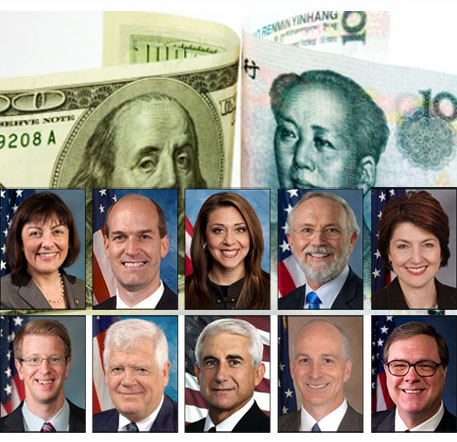NATIONAL
Currency manipulation kills jobs, but does Congress even care?
By DAVID GROVES
The Stand
 WASHINGTON, D.C. (Aug. 19, 2015) — With China’s recent decision to devalue its currency, the AFL-CIO is urging all members of Congress to insist that enforceable rules protecting American workers from currency manipulation be included in any future trade agreements, including the Trans-Pacific Partnership.
WASHINGTON, D.C. (Aug. 19, 2015) — With China’s recent decision to devalue its currency, the AFL-CIO is urging all members of Congress to insist that enforceable rules protecting American workers from currency manipulation be included in any future trade agreements, including the Trans-Pacific Partnership.
China’s undervaluation of its currency artificially raises the price of U.S. exports to China and suppresses the price of Chinese imports into the United States. This manipulation closes opportunities for American business to sell their goods in China while flooding the U.S. market with cheap goods.
“Quite simply, currency manipulation costs jobs,” wrote William Samuel, Director of the AFL-CIO Government Affairs Department in a letter sent to Congress this week. “Existing currency policy has failed. This most recent devaluation undoes four years of progress toward rebalancing China’s unfair currency advantage and demonstrates that relying on China’s good will regarding its exchange rate is a dangerous and unsustainable folly. Last week’s developments highlight the importance of insisting on enforceable currency disciplines in the TPP. Japan, Singapore, and Malaysia are part of the proposed TPP club and all have a history of egregious currency manipulation. China’s devaluation could certainly prompt them to follow suit.” (See the entire letter below.)
Where does Washington state’s congressional delegation stand on combating currency manipulation?
 “Currency manipulation is (a) problem that remains unaddressed,” said Rep. Adam Smith (D-WA), in his statement announcing opposition to Fast Track Trade Promotion Authority in June. “Until we find an effective way to ensure that other countries cannot devalue their currency to boost their exports, U.S. gains from trade will be limited. Finding a solution to currency manipulation matters to American workers and businesses. (The TPP) agreement does not address this issue in a meaningful way.”
“Currency manipulation is (a) problem that remains unaddressed,” said Rep. Adam Smith (D-WA), in his statement announcing opposition to Fast Track Trade Promotion Authority in June. “Until we find an effective way to ensure that other countries cannot devalue their currency to boost their exports, U.S. gains from trade will be limited. Finding a solution to currency manipulation matters to American workers and businesses. (The TPP) agreement does not address this issue in a meaningful way.”
Rep. Jim McDermott (D-WA), who joined Smith and Rep. Denny Heck (D-WA) in voting against Fast Track, is a co-sponsor of the Currency Reform for Fair Trade Act, which would would force action on China’s currency manipulation practices under U.S. trade law.
But what about Washington’s senators and six representatives who voted in favor of Fast Track? Will China’s latest job-killing maneuver spur them to take a tough stand against currency manipulation?
 In May, both U.S. Sens. Patty Murray and Maria Cantwell voted against an amendment to the Fast Track bill to “make it a principal negotiating objective of the United States to address currency manipulation in trade agreements.”
In May, both U.S. Sens. Patty Murray and Maria Cantwell voted against an amendment to the Fast Track bill to “make it a principal negotiating objective of the United States to address currency manipulation in trade agreements.”
In 2010, when Democrats controlled the House of Representatives, legislation was approved to allow the U.S. to seek trade sanctions against China and other nations for manipulating their currency. Although it was not acted upon in the Senate, the House passed it on a bipartisan 348-79 vote, with McDermott and then-Rep. Jay Inslee voting yes. Among those 79 “no” votes were Republican Reps. Dave Reichert and Cathy McMorris Rodgers, and Rep. Rick Larsen (D-WA), one of only five Democrats who voted against the measure.
Since Republicans took control of the House, no votes have been allowed on similar legislation.
 In February, when the U.S. Trade Representative took administrative action against China regarding its export subsidies, Rep. Suzan DelBene (D-WA) said, “China has illegally subsidized manufacturers and producers across seven economic sectors — several of which directly harm businesses and farms in my District… We need strong rules to govern our trade policy, but equally important is the ability to enforce these rules.”
In February, when the U.S. Trade Representative took administrative action against China regarding its export subsidies, Rep. Suzan DelBene (D-WA) said, “China has illegally subsidized manufacturers and producers across seven economic sectors — several of which directly harm businesses and farms in my District… We need strong rules to govern our trade policy, but equally important is the ability to enforce these rules.”
At the same press event on Chinese export subsidies, Rep. Derek Kilmer (D-WA) said, “Washington state is the most trade dependent in the nation, which means our workers are counting on us to make sure they are competing on an even field.”
If they truly support a level playing field for American workers, will DelBene and Kilmer also advocate against job-killing currency manipulation? Stay tuned.
Here is the letter sent this week to all members of Congress by the AFL-CIO’s William Samuel:
Dear Senator/Representative:
Given China’s latest currency moves, it should now be clearer than ever that any completed Trans-Pacific Partnership (TPP) must include rules against currency manipulation — enforceable, when necessary, through recourse to trade sanctions.
Quite simply, currency manipulation costs jobs. The Economic Policy Institute (EPI) estimates that ending currency manipulation could create as many as 5.8 million jobs in the U.S. The U.S. failure to address currency manipulation and undervaluation, and not only by China, has been a major cause of the U.S. manufacturing decline and trade deficit (which stands at more than $508 billion for 2014).
Three separate times last week, China devalued its currency, which is now down 4.4% against the dollar. According to EPI estimates, a prolonged 4% devaluation of the renminbi could reduce U.S. GDP by .14% and cost 190,000 jobs over the next two to three years, while a sustained, cumulative devaluation of 10% could cost .32% of GDP and 430,000 jobs. Furthermore, these are potentially conservative estimates. If China’s actions spur competitive devaluations among rival East Asian export economies, the impact could be even worse. As EPI notes, if China’s actions prompt a wave of devaluations throughout Asia, the result will be bigger U.S. trade deficits and more jobs losses.
Existing currency policy has failed. This most recent devaluation undoes four years of progress toward rebalancing China’s unfair currency advantage and demonstrates that relying on China’s good will regarding its exchange rate is a dangerous and unsustainable folly.
Last week’s developments highlight the importance of insisting on enforceable currency disciplines in the TPP. Japan, Singapore, and Malaysia are part of the proposed TPP club and all have a history of egregious currency manipulation. China’s devaluation could certainly prompt them to follow suit.
In order to better address the scourge of currency manipulation on America’s working families, the AFL-CIO has previously recommended that the TPP incorporate enforceable disciplines on currency manipulation (using criteria such as those developed by the International Monetary Fund) and that Congress enact S.433, The Currency Undervaluation Investigation Act/H.R. 820, The Currecy Reform for Fair Trade Act.
America’s working families cannot afford to simply wait and hope for fair trade. We need your help. We therefore urge you to take prompt, decisive action as outlined above to address currency manipulation both in the TPP and in domestic law.
Sincerely,
William Samuel, Director
AFL-CIO Government Affairs Department





